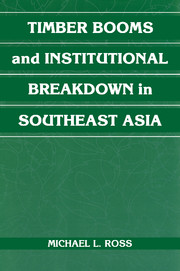Book contents
- Frontmatter
- Contents
- Illustrations
- Tables
- Preface
- 1 Introduction: Three Puzzles
- 2 The Problem of Resource Booms
- 3 Explaining Institutional Breakdown
- 4 The Philippines: The Legal Slaughter of the Forests
- 5 Sabah, Malaysia: A New State of Affairs
- 6 Sarawak, Malaysia: An Almost Uncontrollable Instinct
- 7 Indonesia: Putting the Forests to “Better Use”
- 8 Conclusion: Rent Seeking and Rent Seizing
- Appendix: Chronologies of Events
- References
- Index
8 - Conclusion: Rent Seeking and Rent Seizing
Published online by Cambridge University Press: 30 July 2009
- Frontmatter
- Contents
- Illustrations
- Tables
- Preface
- 1 Introduction: Three Puzzles
- 2 The Problem of Resource Booms
- 3 Explaining Institutional Breakdown
- 4 The Philippines: The Legal Slaughter of the Forests
- 5 Sabah, Malaysia: A New State of Affairs
- 6 Sarawak, Malaysia: An Almost Uncontrollable Instinct
- 7 Indonesia: Putting the Forests to “Better Use”
- 8 Conclusion: Rent Seeking and Rent Seizing
- Appendix: Chronologies of Events
- References
- Index
Summary
This book began with three puzzles: Why did the governments of the Philippines, Malaysia, and Indonesia squander their forests? Why do most governments in the developing world squander commercially valuable forests? And why do developing states generally mishandle resource windfalls? The book's research design – which emphasizes validity over generality – gives me a good deal of leverage over the first question, but less over the second and third questions. Here I summarize the book's findings, and discuss the implications for both policy analysts and social scientists.
POLICY FAILURES IN THE PHILIPPINES, SABAH, SARAWAK, AND INDONESIA
All four states in this study had exceptionally valuable forests. Three of them (the Philippines, Sabah, and Sarawak) initially had relatively strong forestry institutions, and nominal policies of sustained-yield harvesting. Yet all four governments wound up squandering their forests, by authorizing logging at unsustainable rates, by keeping royalties and taxes low, and by failing to enforce logging regulations.
There were undoubtedly many reasons for these policy failures. This book focuses on a single cause: the rents created by high timber prices. When timber prices rose high enough to generate rents, governments in three of the four states (the Philippines, Sabah, and Sarawak) stripped their forestry departments of much of their authority over the timber sector, and abandoned their policies of restricting logging to sustained-yield levels.
- Type
- Chapter
- Information
- Timber Booms and Institutional Breakdown in Southeast Asia , pp. 190 - 204Publisher: Cambridge University PressPrint publication year: 2001



